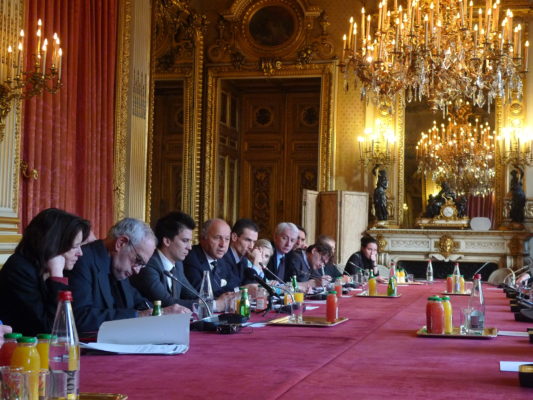French Foreign Minister Laurent Fabius met February 6 with close to 40 AAPA members to discuss France’s priorities and concerns in the foreign policy domain.
In an ornate setting at the Quai d’Orsay, Fabius went “off the record” to explain his government’s concerns about Europe, Syria, Lebanon, Mali, Iran, the Middle East Peace Process and many other topics.
For about 90 minutes, in a relaxed, round-table format, the Foreign Minister gave his vision of how the international community should tackle the crises at hand, noting the difficulties of getting consensus in several areas and stating how he thought France could influence developments.
On Europe, he stressed that the EU budget talks “were not easy” but expressed hopes that the longer-term objectives could be balanced with shorter-term considerations – a compromise which was visibly the outcome of the EU Summit on February 7-8.
Fabius, who underlined his close involvement with EU issues, indicated areas where Europe was working well energy and “enhanced cooperation,” for example, – and he was very reticent about any moves towards what he has publicly labeled “a self-service Europe.”
But he said that there could be a move towards a differentiated Europe whereby some countries would have the option of moving faster with certain policies while others might take a different, albeit slower, path.
Speaking “on-the-record” on Mali, Fabius said that France had no intention of maintaining its 4,000 troops in that country and could start reducing the number of troops in March, conditions on the ground permitting. He said the aim was to replace French forces with an African force, which is already being deployed.
But he went a step further in saying that France also wanted a UN “blue-helmet” force to be the ultimate peace-keepers in Mali and this could take place as soon as April.
France is anxious to hand over the “operational and financial” responsibility in Mali to the UN, he remarked.
Fabius also urged renewed efforts for peace in the Middle East, where “the ups and downs” are good for no-one, including Israel.
Recent contacts February 4 with U.S. Secretary-of-State John Kerry addressed this issue as well as the Syrian crisis and the Iranian nuclear controversy, among others, he said.
John Keating
